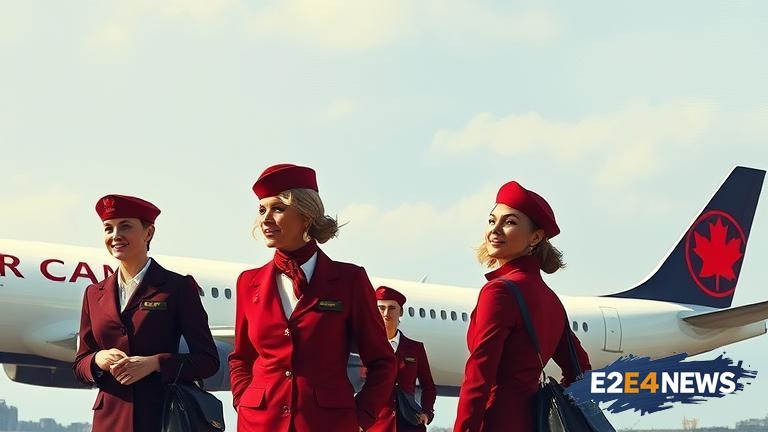Air Canada flight attendants are poised to vote on a tentative agreement that could potentially alter the course of their employment. The agreement, which was reached after months of negotiations, has been met with skepticism by some workers and experts. They argue that the proposed deal does not adequately address concerns over wages, benefits, and working conditions. The union representing the flight attendants, the Canadian Union of Public Employees (CUPE), has recommended that its members accept the agreement. However, some workers are hesitant, citing the need for better compensation and improved working conditions. The tentative agreement includes provisions for wage increases, improved benefits, and enhanced job security. Nevertheless, some experts believe that the agreement does not go far enough in addressing the concerns of flight attendants. They point to the fact that the agreement does not provide for significant wage increases, and that the benefits package is not as comprehensive as it could be. Furthermore, some workers are concerned about the impact of the agreement on their working conditions, including the amount of time they spend on duty and the number of days off they receive. The vote on the tentative agreement is expected to be close, with some workers strongly in favor of accepting the deal and others vehemently opposed. The outcome of the vote will have significant implications for the future of Air Canada and its employees. If the agreement is rejected, it could lead to further negotiations and potentially even job action. On the other hand, if the agreement is accepted, it could provide a sense of stability and security for flight attendants. The situation is being closely watched by industry experts, who are eager to see how the vote will play out. Some have speculated that the outcome of the vote could have far-reaching consequences for the airline industry as a whole. Others have noted that the situation highlights the ongoing challenges faced by airlines and their employees in the wake of the COVID-19 pandemic. The pandemic has had a devastating impact on the airline industry, with many airlines struggling to stay afloat. As a result, airlines have been forced to make difficult decisions about wages, benefits, and working conditions. The situation at Air Canada is just one example of the challenges faced by airlines and their employees. In recent years, there have been numerous instances of labor disputes and negotiations in the airline industry. These disputes have often centered on issues such as wages, benefits, and working conditions. The situation at Air Canada is likely to be closely watched by other airlines and their employees, who will be eager to see how the situation plays out. The vote on the tentative agreement is expected to take place in the coming weeks, and the outcome is far from certain. Some workers have expressed concerns about the voting process, citing the need for greater transparency and accountability. Others have noted that the vote will be a crucial test of the union’s ability to represent the interests of its members. The situation at Air Canada has also sparked a wider debate about the state of the airline industry and the challenges faced by its employees. Some have argued that the industry needs to do more to support its workers, including providing better wages, benefits, and working conditions. Others have noted that the industry is facing significant challenges, including increased competition and rising costs. The situation at Air Canada is a complex and multifaceted one, with many different factors at play. As the vote on the tentative agreement approaches, one thing is clear: the outcome will have significant implications for the future of the airline and its employees.
